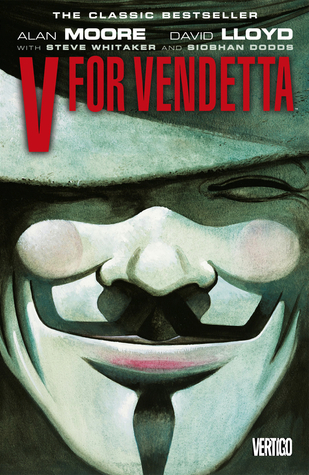
V for Vendetta
Book Description
A masked vigilante rises from the ashes of a dystopian London, igniting a revolution against a tyrannical regime. With every act of defiance, the enigmatic V unveils the brutality of oppression while rallying the disenchanted to dream of freedom. But as fear grips the nation, a timid woman named Evey becomes entwined in V’s dangerous game of cat and mouse. Betrayals lurk in every shadow as trust shatters and emotions soar. Will V's grand vision of a liberated society triumph, or will the grip of tyranny prove too strong? Can hope emerge from the darkness when all seems lost?
Quick Book Summary
"V for Vendetta" is a dystopian graphic novel set in a totalitarian, post-apocalyptic Britain ruled by the fascist Norsefire regime. The mysterious masked vigilante known as V launches a campaign of terror and resistance, aiming to free the populace from oppression. Throughout his exploits, V rescues Evey Hammond, a vulnerable young woman caught up in his revolutionary schemes, gradually transforming her into a defiant ally. The novel explores themes of power, identity, and resistance as societal structures crumble and personal traumas are laid bare. Through sabotage and symbolic acts, V inspires a suppressed people to reclaim agency, challenging readers to question authority and the cost of freedom. Ultimately, the story navigates the complex interplay between individual agency and collective revolution.
Summary of Key Ideas
Table of Contents
Totalitarianism and State Control
Set in a bleak future Britain ruled by the authoritarian Norsefire party, "V for Vendetta" paints a chilling vision of a society controlled by fear, surveillance, and propaganda. In the aftermath of a nuclear war, the regime enforces draconian order, eliminating dissent through brutal means. Citizens are conditioned to accept their fate, with individual freedoms slowly eroded away. This oppressive landscape provides the backdrop for the rise of a mysterious figure known only as V, whose subversive acts unsettle the state's iron grip, threatening to inspire hope amidst the darkness.
Identity, Mask, and Anonymity
V, wearing a Guy Fawkes mask, orchestrates acts of sabotage targeting symbols of oppression such as government buildings and media channels. His methods are theatrical and highly symbolic, seeking not just to destroy but to provoke thought and awaken the public. V's philosophy is anarchic: he believes that only by toppling totalitarian entities and shaking people from their apathy can true liberty be restored. He meticulously plans his campaign, ensuring every step has far-reaching consequences for the regime and the psyche of the populace.
Revolution and Resistance
Evey Hammond, introduced as a naive and vulnerable young woman, becomes entangled in V's revolutionary mission after he saves her from government agents. Initially overwhelmed and frightened by V's radicalism, she undergoes a harrowing psychological trial at V’s hands—meant to simulate the oppression and fear she must overcome. Through suffering, Evey emerges empowered, developing the courage to act independently and question authority, symbolizing the personal transformation the revolution seeks to spark in all individuals.
Psychological Transformation and Empowerment
As V's campaign escalates, the regime retaliates with increasing desperation, exposing its foundational corruption and cruelty. Key figures in Norsefire are hunted or revealed to be complicit in atrocities, fracturing the regime's unity. Citizens, inspired by V's example and the symbolism of his mask, begin asserting their agency, culminating in mass acts of resistance. Tension mounts as betrayal and sacrifice become inevitable, leading both sides toward a dramatic confrontation and ultimate reckoning.
The Cost and Nature of Freedom
The novel concludes on a note of complex ambiguity. While V succeeds in destabilizing the regime and inspiring public revolt, his own death leaves the revolution’s future uncertain. Evey, inheriting V’s mantle, becomes a symbol of continuity for the ideals he embodied. The narrative challenges readers to consider the price of freedom, the ethics of revolutionary violence, and the enduring power of ideas to transform societies. Through powerful visuals and nuanced storytelling, "V for Vendetta" remains a resonant exploration of oppression and the indomitable human spirit.
Download This Summary
Get a free PDF of this summary instantly — no email required.





